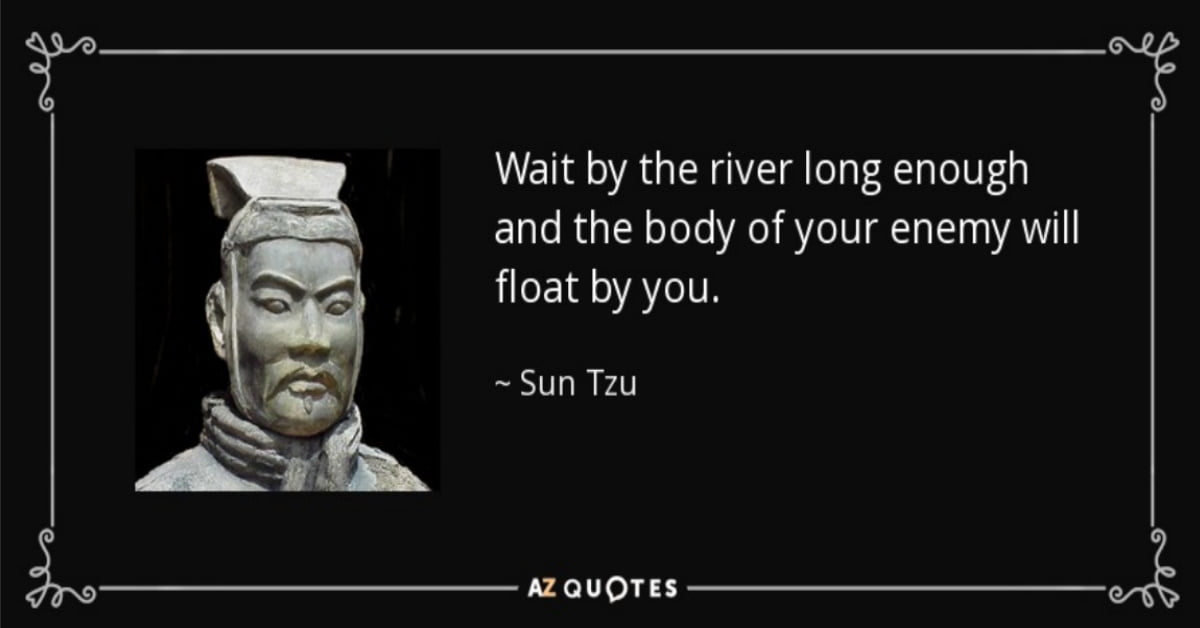It is generally accepted that the wisdom “If you sit for a long time on the bank of a river, you can see how the corpse of your enemy floats past” belongs either to the philosopher Confucius, or to the thinker Sun Tzu. We checked how plausible this statement is.
Nobel laureate in literature Joseph Brodsky made this, as he calls it, a Chinese proverb as an epigraph to his essay "Collector's item". On the website "RIA Novosti"It is also reported that this is an ancient Chinese proverb, "RBC-Sport" clarifies that the author of the phrase is the commander and strategist Sun Tzu, but the readers Radio Liberty may see the name of Confucius next to it. On RBC In general, the name of the philosopher Lao Tzu appears. The latter is also often mentioned as the author of this quote in various collections of aphorisms. A popular catchphrase in West.
And indeed, this saying has become so firmly established in our lives that it seems as if it has always existed - at least since ancient times. However, searching in Russian brings unexpected results. One of the relatively early mentions is not connected with the river bank at all: “According to the Eastern proverb: be patient, sit quietly on the porch, and sooner or later the corpse of your enemy will be carried past” (magazine "Moscow", 1985). Similar phrases, only with a threshold instead of a porch, are given in literary sources 2002 And 2003 years. And the “river bank” is mentioned by Alexander Zinoviev (1989), the above Joseph Brodsky (1991), Nikolay Psurtsev (1994), Mikhail Panin (1996) and a number of other writers. The publication in the magazine “Working Class and the Modern World” stands out (1978) - it dates back to 1978. Well, in the memoirs of Soviet volunteers - participants in the Spanish Civil War (1965) it is said: “But being optimistic does not mean sitting idly by, waiting for the corpse of our enemy to be carried past us.” In the same year, in a collection of essays "Two worlds, two youths" the phrase “The duty of every revolutionary is to make a revolution, and not to sit at the door of his house waiting for the corpse of imperialism to be carried past” appears. As for the line “The enemy’s corpse floats on the wave” from the collection of the Soviet poet Teimuraz Dzhangulashvili (1960), then its connection with the catchphrase is not obvious. It is worth noting that in all the earliest Russian-language references to the phrase - both with the floating corpse of the enemy and with the one being carried - no mention is made of its Chinese origin.
As for foreign sources, among them there are also quite popular works. Umberto Eco in his Marginal Notes on The Name of the Rose (1983) mentions the phrase about the shore as an Indian (or Indian) proverb. Adapted from the bestselling novel by James Clavell "Shogun" (1975) it is spoken by a Japanese hero. The saying is also named as a Japanese proverb in the action movie "Rising Sun" (1993) with Sean Connery. But earlier English-language examples of mentioning the phrase, as in Soviet sources, are a variant with a threshold (1950 And 1956 years). Moreover, in the second case, a foreign author put it into the mouth of Felix Edmundovich Dzerzhinsky - apparently, considering it a Russian proverb. In a 1948 source there is a saying attributed to Moors - Arabic-speaking inhabitants of northern Africa (and this is not her only attribution Arabs). Before 1948, there were practically no variants of this phrase in English.
Let us finally turn to Chinese sources. The famous treatise of Sun Tzu "The Art of War" has survived to this day, but it does not contain such quotations. There is nothing similar in the surviving works of Confucius. A very long-distance connection can be seen with quote “Standing on the bank of the river, the Teacher said: “Everything flows away, like these waters, every day and every night.” One not very convincing theory assumes, that “gone” could be incorrectly translated as “gone,” that is, “dead” (in addition, there is an alternative interpretation this phrase), however, it is still very far both in form and in meaning from the desired phrase. Many Chinese claim that they have never heard of such a phrase in their homeland, and one of the leaders of the People's Bank of China, quoting it, refers not on his compatriots, but on the French economist Eric Pichet. Similar statements by Lao Tzu have not reached us. There is no trace of the phrase appearing in Japan either.
From all this we can draw the following conclusion. Until the second half of the 20th century, the proverb about the enemy’s corpse existed in a “land” version with a threshold and its analogues, and it was not widespread at all in East Asia. In addition, she was almost unknown either in the West or in Russia. In the second half of the 20th century, it merged with one of the Chinese phrases about the river bank (possibly with the above quote from Confucius), and the spread of this variant was facilitated by the works of popular Western authors. However, neither Lao Tzu, nor Confucius, nor Sun Tzu, nor any other anonymous ancient Chinese author was directly involved in its birth.
Incorrect quote attribution
If you find a spelling or grammatical error, please let us know by highlighting the error text and clicking Ctrl+Enter.






